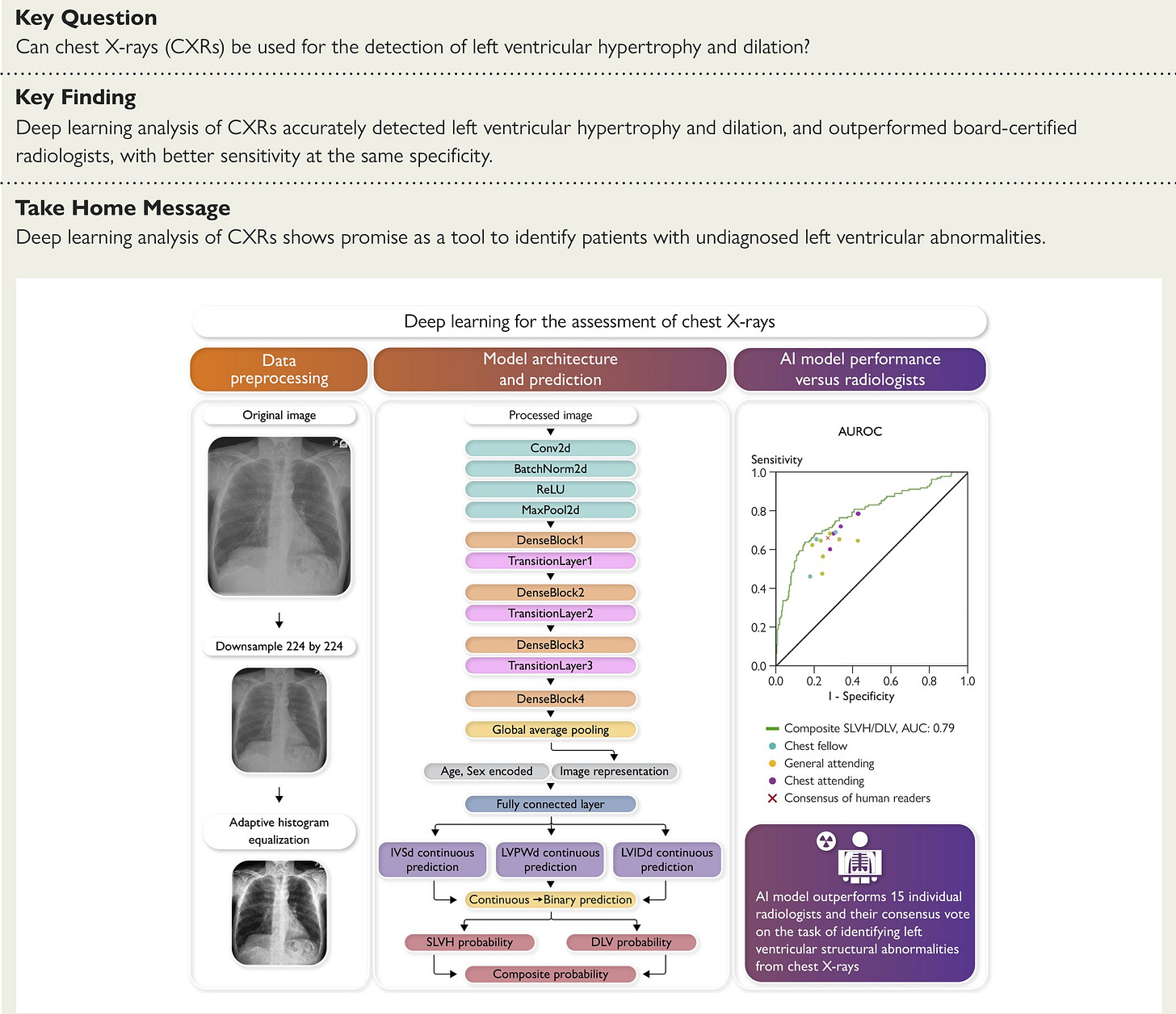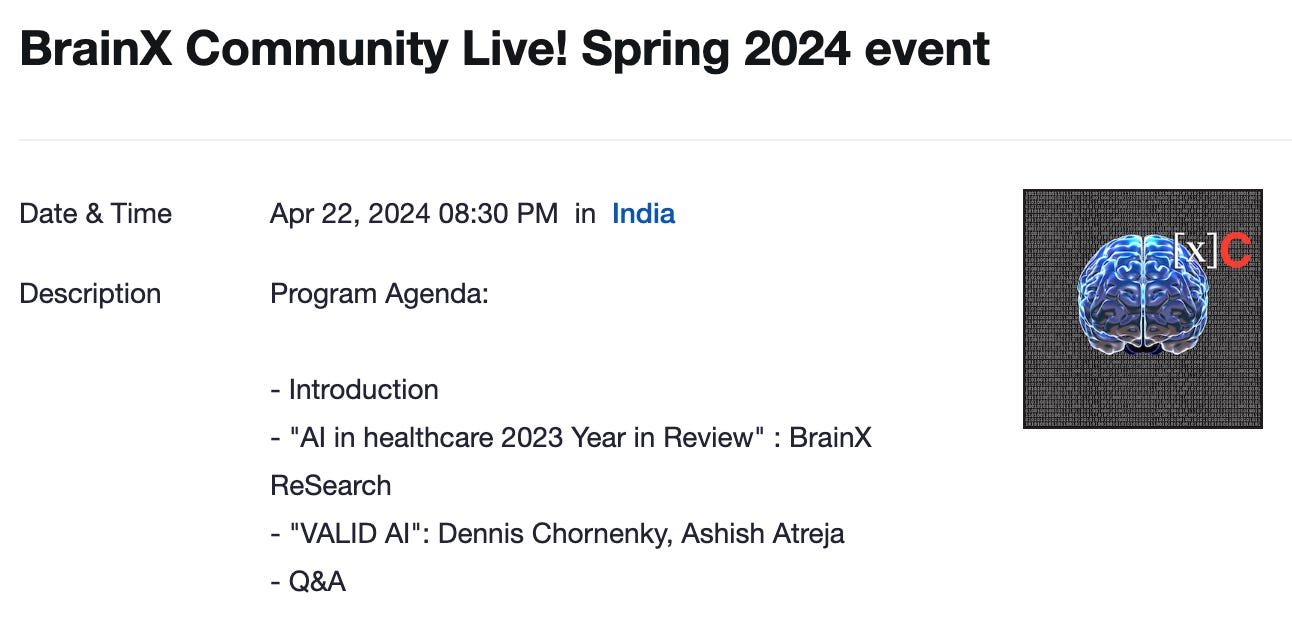🚀 Unlock Tomorrow's Medicine Today: Discover Voice Restoration Innovations, AI-Enhanced Clinics, and the Future of Robotic Surgery 🤖
Updates on Artificial Intelligence & Emerging Technologies in Medicine 🤖🩺🚀
“Medicine in the future will give everyone the ability to become their own best healer.” - Deepak Chopra
Dear Med AI Enthusiast,
Welcome to The ‘Med AI’ Capsule weekly newsletter, your inside look at how artificial intelligence and emerging technologies are transforming medicine.⚕
Whether you're a medical professional 👩⚕️, a technology enthusiast 💻, or simply someone with a curious mind 🧠, The 'Med AI' Capsule is designed for you.
It helps you stay informed 📰 about the latest groundbreaking updates and offers insights into the rapidly evolving world 🌍 of artificial intelligence and emerging technologies in medicine.
Let the adventure begin! I'm thrilled to have you along for the ride. 🚀
In today’s capsule:
3 News Updates (1 Deep Dive)
3 Research Updates (1 Deep Dive)
2 Innovative Companies (Industry Showcase)
2 Upcoming Events
1 Knowledge Resource
1 Infographic
Reading Time: 5-7 minutes
News Updates 📰
1. 🗣️ UCLA Engineers Unveil Revolutionary Throat Patch for Voice Disorders
A groundbreaking device developed by UCLA's engineering team, led by Jun Chen, promises a significant advancement for individuals with voice disorders.
This soft, stretchy patch, designed to be worn on the throat, detects laryngeal muscle movements and translates them into audible speech using machine learning technology, boasting an impressive 95% accuracy rate.
Why Important: For people suffering from voice disorders due to conditions like laryngeal cancer or vocal cord pathologies, the ability to speak can be severely hindered or lost entirely.
Traditional treatments can be invasive, uncomfortable, and require lengthy recovery times. This device offers a non-invasive, wearable solution that could revolutionize the way voice disorders are managed, providing a more immediate and less burdensome method for restoring speech.
"Existing solutions such as handheld electro-larynx devices and tracheoesophageal- puncture procedures can be inconvenient, invasive or uncomfortable.” - Jun Chen
Caution: While the device has demonstrated high accuracy and potential, it is still in the development and testing phases. Initial trials have been conducted on healthy adults, and the next steps involve expanding its vocabulary through machine learning and testing on individuals with actual speech disorders.
As with any new medical technology, further research and testing are needed to ensure its efficacy and safety for a broader range of patients.
2. 🔍 Elsevier Health Introduces ClinicalKey AI: A Revolutionary AI-Powered Clinical Decision Support Tool
Elsevier Health has unveiled ClinicalKey AI, a groundbreaking clinical decision support tool integrating generative AI with comprehensive medical resources, designed to provide clinicians swift, personalized access to vital medical information at the point of care.
This innovative tool aims to enhance patient care quality by facilitating more accurate and efficient clinical decision-making amidst the challenges of complex case management and staffing shortages, while emphasizing the importance of complementing rather than substituting the expertise of healthcare professionals.
3. 🔬 AI Shows Promise in Detecting Health Care-Associated Infections
A recent study demonstrates the effectiveness of AI tools, like OpenAI's ChatGPT Plus and an open-source model, in accurately identifying health care-associated infections from complex patient scenarios, suggesting a promising avenue for enhancing infection surveillance with cost-effective and efficient monitoring.
However, the study underscores the critical need for clear data input and human oversight to ensure AI's accuracy and reliability, emphasizing the importance of meticulous data management and validation by healthcare professionals.
Research Updates 🔬
1. 🔍 AI Shows Potential for Revolutionizing Heart Failure Detection with Chest X-Rays

In a groundbreaking study published in the European Heart Journal, a team of researchers led by Shreyas Bhave and Victor Rodriguez developed a deep learning model capable of identifying severe left ventricular hypertrophy (SLVH) and dilated left ventricle (DLV) through chest X-rays (CXRs), potentially enabling an earlier diagnosis of heart failure.
Key Findings:
The model achieved an AUROC of 0.79 for SLVH and 0.80 for both DLV and a composite label on an external dataset, demonstrating its effectiveness and reliability in detecting critical cardiac structural abnormalities.
The study provides a promising direction for using CXRs, a common and low-cost diagnostic tool, to screen and identify patients at risk of heart failure at an early stage.
Limitations:
The study acknowledges potential biases in continuous echocardiographic measurements, limitations in identifying certain patient subpopulations, and the challenge of generalizing the model across different sites due to varying patient populations and imaging techniques.
This advancement suggests a significant step towards leveraging artificial intelligence in cardiology, potentially transforming the way early-stage heart failure is diagnosed and treated. With over 71,589 CXRs analyzed, this model not only offers a novel approach to diagnosing heart failure but also underscores the immense potential of AI in enhancing patient care.
2. 🚀 New AI Model Outshines Traditional Methods in Early Gastric Cancer Screening
Researchers have developed the XHGC20 model, a groundbreaking machine learning algorithm that significantly advances early gastric cancer detection by efficiently distinguishing between cancerous and precancerous conditions using 20 clinical lab tests.
Despite its promising performance, especially in identifying early-stage GC and patients negative for conventional tumor markers, the study's limitations include its single-hospital data source and reliance on existing clinical tests, underscoring the need for wider validation and potential integration of more specific biomarkers.
3. 🤖 Virtual Reality Triumphs Over E-Learning in Training for Robotic Surgery Set-Up
The study reveals immersive virtual reality (IVR) training as more effective than e-learning for teaching medical students to set up the CMR Versius robotic system, with IVR-trained participants performing more independently and requiring fewer interventions.
Highlighting the shift towards interactive learning in surgical education, the research advocates for IVR's inclusion in training protocols to better prepare students for robotic surgery, despite limitations such as a small sample size and potential scoring subjectivity.
Industry Showcase 👨🏭
Treat - Utilizes AI to streamline medical documentation, allowing healthcare professionals to focus more on patient care. They strictly adhere to HIPAA compliance, ensuring patient privacy is maintained by not storing any patient recordings, thereby enhancing trust in its use within healthcare settings.
At treat we work to transform clinics into tech-driven hubs. treat utilizes advanced AI technology to streamline medical documentation in real-time, enabling healthcare professionals to dedicate more focus to their patients. Let us do the note for you!
Enjoy a $59 coupon available only for this community. Coupon: Dr.AK567
Take your clinic to the next level now, click here: treatMuskan AI - leverages AI to transform dental care in India, offering tools for improved patient engagement, diagnosis, and treatment, while ensuring data privacy and accessibility. It is designed to enhance the dental health ecosystem by training its AI with expert input, making dental care more interactive, and affordable.
Upcoming Events 🧑💻
Knowledge Resource 📚
Blog Post: 10 Ways To Get Started In AI — Without Being Technical
AI Integration: The article emphasizes that AI is not just the future, but a present reality, and encourages professionals to integrate AI tools like ChatGPT into their businesses.
Accessible AI: Allie K. Miller, an AI leader, highlights that AI isn’t only for engineers and that there’s a place for professionals from all fields in AI projects.
AI Learning: The article provides a list of 10 ways for individuals to become familiar with AI, suggesting starting with AI newsletters and testing out AI tools.
Career Advancement: It outlines steps for non-technical individuals to build a career in AI, including reading about AI trends, forecasting job evolution, and finding an AI mentor.
The article serves as a guide for those looking to start or transition into a career in AI, offering practical advice and resources.
Let’s wrap it up with an infographic! 📊
Your feedback is crucial to me, as it helps me understand your interests and improve my offerings. I would appreciate it if you could take a few minutes to share your thoughts about what you've enjoyed and what you think I could do better - https://forms.gle/xpbpgVEyARWx6ZxN8
Stay tuned for our upcoming editions as we explore the latest breakthroughs and dive deep into the transformative power of artificial intelligence and emerging technologies, shaping a healthier future. 🚀
Warm regards,









